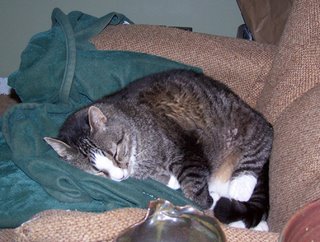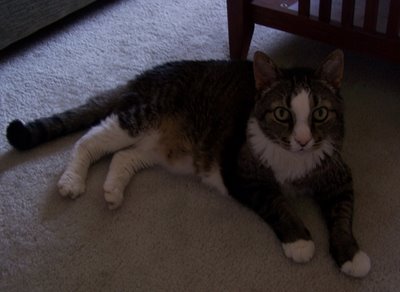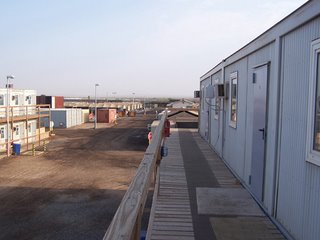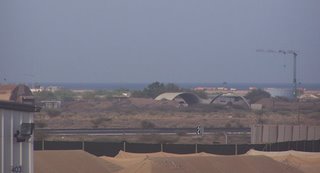You may be wondering, what exactly IS Smitty doing out in this God-forsaken armpit of the world? A fair question, certainly, with multiple answers, and I'll take the next week or so and make an attempt at answering it. Incidentally, if you look at the Red Sea and Gulf of Aden, and the east coast of Africa along those bodies of water, and place Djibouti on it, you'll note that this really is sort of the left armpit of Africa (the Bight of Biafra being the right). It smells, too, because they burn trash every night. Actually, they burn trash every day, too; there's a perpetual trash fire about a mile from the base. But the wind blows during the day so you don't notice it as much.
Anyway. Enough about burning trash and armpits. Why did Uncle Sam plunk a base down
here?
The obvious answer is Somalia, but officially we pulled out of Somalia thirteen years ago and haven't looked back. This is more or less true, and in fact we have no activities inside the country at all, apart from mild diplomatic pressure on the various pseudo-governmental agencies operating there.
Somalia is not a country. It is a patch of earth the size of Texas, containing some nine million people who don't have the resources to feed themselves and consequently are constantly fighting. There are wars going on between subclans out there in the desert that have been going on since before the United States existed. Somalia is a quarrel with borders.

As it is the place has no less than four significant competing governments, plus a host of others and, anyway, most administration is local. Officially the place still has "provinces," though only Puntland and Somaliland pretend to recognize the old borders or names of those.
Somaliland is the reasonably stable and secure northern bit of old Somalia (purple on the map), about the size of x, which has been run somewhat successfully by a functional democratic government with several competing parties for at least the last eight years. It exists within the old borders of the colony of British Somaliland and believes this gives it the right to exist as an independent nation, apart from the rest of Somalia, which was a former Italian colony.
This is a key point. The African Union (AU) as a simple matter of policy does not recognize independence movements within member states (all African states save Morocco are members of the organization, and although Somalia has no functioning government border integrity there matters to the AU because the organization doesn't want to set precedents for other independence movements, of which Africa has at least a score). However, the AU does recognize the right of the Western Sahara (or Sahrawi Arab Republic) to self-determination (which is why Morocco left the organization), because it was a former Spanish colony administered separately from Morocco, and has stated that colonial borders, absurd as they are, must be respected—Africans, in other words, need to learn loyalty to their states and not their ethnic groups. This point of view is controversial, but there are good reasons for it; I may get into these in another post. On this basis, the leaders of Somaliland have pressed the AU for formal recognition along the borders of British Somaliland, but so far there's been no progress. British Somaliland in fact gained independence four days before Italian Somaliland; the two merged to form Somalia the day the Italian part gained independence, but those four days are basis enough for Somaliland to feel it has a right to self-determination.
Ethiopia might be willing to recognize Somaliland, but because of old animosity between Somalis and Ethiopians, it would be diplomatically unacceptable for Ethiopia to be the first country to do so. Djibouti, also, might be willing, being as how Djibouti is a majority-Somali country with no desire to join a "greater Somalia." Djibouti also wants to play a larger role in the region, politically; but this means not annoying the various people who currently run other bits of Somalia, who don't want to recognize Somaliland. Western countries including the U.S. might recognize the place, but won't because A) it is felt the AU needs to take the lead on the matter, and B) officially all Western countries support the
Transitional Federal Government of Somalia (TFG), orange on the map, which nominally is the government for the whole patch of territory formerly called Somalia, including Somaliland. Recognizing Somaliland would imply downgrading the importance of the TFG. If the country is to be recognized, it will be by the AU acting as a unified body with one voice; right now the political will isn't there, for a variety of reasons, some of which I'll get into later. Consequently, Somaliland exists in a sort of diplomatic limbo, as do its people.

To the east is
Puntland, blue on the map, which like Somaliland has declared independence and has been reasonably democratic and stable, though not so much as Somaliland. However, Puntland's government officially wishes to rejoin a united Somalia (which places it at odds with Somaliland), once such a beast can be said to exist. But the Puntland government has not in the past considered the TFG legitimate and so remains apart from the group. Puntland also wishes to rejoin a secular Somalia, not an Islamist one, and this brings it into conflict with the
Council of Islamic Courts (CIC), green on the map, which currently controls Mogadishu. Thus Puntland is at odds with every one of its neighbors, and has been criticized by the West and Yemen for allowing mass migration from its shores across the Gulf of Aden to Yemen, which has porous if extremely dangerous borders with its rich neighbor Saudi Arabia; that's where many Somalis and Oromo (an Ethiopian tribe that is about 60% Muslim and 40% Christian) are headed.
The implications of this migration are very bad, considering that Saudi Arabia has a history of producing dangerous fundamentalists, and anyway doesn't have enough jobs for its own population let alone any illegal immigrants. Poverty and rejection await most Somali and Oromo migrants to Yemen and Saudi, and those two things tend to produce young men who are susceptible to the Islamist siren-song. Thus most Western states—as well as most Arab ones—find it vital that Puntland stop the migration from its coasts, though since Puntland is not recognized officially by any country, it receives no help whatsoever in stopping said migration, a sort of catch-22.
Puntland in the past month has started to gravitate towards the TFG, because although Puntland's leaders don't see the TFG as legimimate, they see the CIC as a graver threat. Allying with the TFG may or may not be a good idea; in any event, we should assume that although Puntland might call on the TFG if attacked by the CIC, Puntland would not likely come to the TFG's defense.
There are several other smaller pseudo-states; those marked on the map include Southwest Somalia, Southern Mudug, Jubaland, and the Juba Valley Alliance.
Southern Mudug, red on the map, is mostly an outpost of the northern subclans of the Hawiye
clan, centered around the small port of Hobyo (red on the map). The CIC is mostly controlled by Hawiye clansmen. Southern Mudug is a quiet entity and will likely accept CIC control when the courts and their militia come knocking. This will likely occur before year-end.
 Jubaland
Jubaland (if the Juba Valley Alliance is included) more or less matches the old boundaries of an Omani and then British client-state that exist in the 18th C. under the same name. This area has no claim to independence similar to Somaliland, and in any event is run by a warlord and has not made a serious effort to assert itself as a state. The leader of Jubaland (which is yellow on the map) has thrown in with the TFG and is a member of the cabinet.
Southwest Somalia (pink on the map), like Jubaland, associates with the TFG, but the warlords who control the eastern and western sections of it, although cabinet members in the TFG, maintain the autonomy of Southwest Somalia. Political this is fairly sensible, since the TFG is never more than a few days away from collapse. If the government collapses either under its own weight or under attack from the CIC, the warlords will retreat to their redoubts and fight on from there.
That leaves the TFG and CIC, which are headquartered in the towns of Baidoa and Mogadishu, respectively. These towns are barely 100 km apart, and a number of smaller towns between them have changed hands between the CIC and TFG several times. The TFG, which never was able to successfully bring order to Mogadishu, controls very little territory outside Baidoa. The CIC, on the other hand, which receives significant support from abroad, has managed to threaten, cajole, and in some cases buy off the local clan leaders in several areas around Mogadishu and as far afield as Galcaio to the north and Kismaayo to the south. Kismaayo had been run by a fellow named Barre Hirale, who ran the area around the city under the name
Juba Valley Alliance (JVA) (red-orange on the map) and acted much as the government of Puntland does.
Barre Hirale is an interesting character. Unlike Puntland's leadership and like that of Jubaland and Southwest Somalia, Barre Hirale threw in with the TFG and took a cabinet position, but maintained the autonomy of the JVA. Then a couple weeks ago the CIC came knocking at his door, and he struck a deal and left them in control of the town, retreating with his militia to Baidoa some 150km northwest. Late last week, Barre Hirale decided he liked ruling the JVA better than being the defense minister of the impotent TFG, and marched on Kismaayo. The outcome of the fighting there is not clear as of this writing (although tonight the CIC seems to have the upper hand), but it seems likely that if Barre Hirale wins he won't soon trade his position for any carrots the TFG might offer, or the CIC, short of the top job.
It's worth pointing out that Kismaayo and the Juba Valley are the most productive parts of Somalia by a wide margin, and thus are worth fighting for. A Somalia without control of the Juba Valley would be utterly unable to feed its people, and both the TFG and CIC are well aware of that, as clearly is Barre Hirale, who fancies himself kingmaker, if not king. This is also the part of Somalia closest to the Kenyan border, and this has presented its own trouble to the Kenyan government.
That said, Somalia is not a sand desert like Egypt. The few pictures of the Djiboutian countryside I've been able to post on this blog are indicative of the country as a whole—and indeed, Djibouti is in the driest and hottest part of the Horn of Africa; much of Somalia is slightly more productive. Still, it is a land of grazing and herding, not intense agriculture, apart from in the Juba Valley. There is no question but that the number of people living here is far, far higher than what the land can actually support.
I've included a little map I made up with all the cities I mentioned, plus rough zones of control of Somaliland, Puntland, the TFG, the CIC, and the Juba Valley Alliance. Other parts of the country (in white) are still run more or less by local clan leaders, small-time versions of Barre Hirale. They are open to influence by the CIC or the TFG, but the CIC has the upper hand as the TFG is both utterly incompetent and devoid of legitimacy
and has invited the hated Ethiopian National Defense Force onto Somali soil.
There is no likelihood of Somalia developing a stable national government any time in the near future. The CIC has successfully calmed Mogadishu, reopened the port and airport, and claims to be running the place well. There are cracks in the leadership, though, and as the CIC tries to expand outside Mogadishu and the area controlled by the Awale clan, there has been more difficulty. Somalis are inherently more loyal to their clan and subclan than to their government, employers, or religion. Earlier this summer it looked as if the CIC would march across Somalia and unite the country at last, but this now seems highly unlikely and, if anything, it seems the CIC will ultimately become a source of instability in the region.
The TFG, however, couldn't lead people to the bathroom after five cups of coffee. Earlier this summer half the cabinet (which had over 60 members) resigned in an effort to make the TFG President, Abdullahi Yusuf, strike a deal with the CIC. But the TFG president was under pressure from other agents (i.e. the AU, EU, U.S., and most of the rest of the world) to hold his ground. Yusuf is a prickly character not suited to his position. He fired his first prime minister, reduced the size of the cabinet (a good thing), and still has been unable to control the government. The TFG doesn't even keep the peace in Baidoa, relying on local militias to do so instead, and its small security force has proven incapable even of keeping Yusuf himself out of harm's way.
Consequently the TFG invited the Ethiopian National Defense Force into Baidoa earlier this year. The exact degree of ENDF involvement in TFG decision making and security is unknown; the TFG insists the ENDF only provides logistical and training support, but many locals say otherwise and the CIC, which has made much hay rallying Somalis around the anti-Ethiopian flag, says the ENDF are running wild around the countryside. Meanwhile the CIC itself has sent teams to Puntland and Somaliland in attempts to destabilize those countries, though thus far Somaliland has remained calm. Puntland leadership have called in ENDF support—something Barre Hirale has not done in his effort to retake the Juba Valley.
Ethiopia has a number of good reasons for wanting to be involved here. It should come as little surprise that at least eleven other countries are involved in Somalia in one way or another, not including the various Somali pseudo-states. But that's for tomorrow.

 Then, of course, my cat was diagnosed with cancer and I learned and had to make peace with the fact that one of my best friends for the past sixteen years wasn't going to be there when I got home. This wasn't easy, but what must be done must be done. I passed one very hard night, and the next morning I woke up and knew that I'd said goodbye. I'll miss the old boy. Incidentally, here's a little picture of him and my folks' cat, Hobo, taken in the last couple days. He's certainly gotten skinny, but he looks just fine.
Then, of course, my cat was diagnosed with cancer and I learned and had to make peace with the fact that one of my best friends for the past sixteen years wasn't going to be there when I got home. This wasn't easy, but what must be done must be done. I passed one very hard night, and the next morning I woke up and knew that I'd said goodbye. I'll miss the old boy. Incidentally, here's a little picture of him and my folks' cat, Hobo, taken in the last couple days. He's certainly gotten skinny, but he looks just fine.











